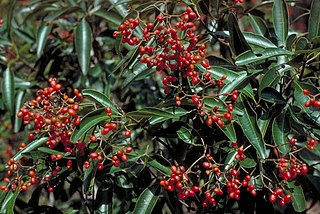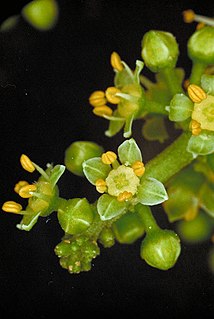
Flindersia ifflana, commonly known as hickory ash or Cairns hickory, is a species of tree in the family Rutaceae and is native to Papua New Guinea and Queensland. It has pinnate leaves with between four and twelve egg-shaped to elliptical leaflets, panicles of white or cream-coloured flowers and woody fruit studded with rough points.
Flindersia laevicarpa, commonly known in Australia as rose ash, scented maple or dirran maple, is a species of medium-sized to large tree in the family Rutaceae and is native to Papua New Guinea, West Papua and Queensland. It has pinnate leaves with four to eight egg-shaped to elliptical leaflets, panicles of cream-coloured, yellowish, red or purple flowers and smooth woody fruit that split into five at maturity, releasing winged seeds.

Flindersia pimenteliana, commonly known as maple silkwood, red beech or rose silkwood, is a species of tree in the family Rutaceae and is native to New Guinea and Queensland. It has pinnate leaves with three to seven egg-shaped to elliptic leaflets, panicles of red or reddish flowers and fruit studded with rough points.

Flindersia schottiana, commonly known as bumpy ash, cudgerie or silver ash, is a species of rainforest tree in the family Rutaceae and is native to New Guinea and eastern Australia. It has pinnate leaves with mostly ten to sixteen leaflets, panicles of white flowers and woody fruit studded with rough points.

Flindersia brayleyana, commonly known as Queensland maple, maple silkwood or red beech, is a species of tree in the family Rutaceae and is endemic to northern Queensland. It has pinnate leaves with between six and ten leaflets, panicles of white or cream-coloured flowers and smooth fruit that opens in five sections to release winged seeds.

Melicope elleryana, commonly known as pink flowered doughwood, pink evodia, corkwood, or saruwa, is a species of rainforest shrub or tree in the family Rutaceae, and is native to New Guinea, parts of eastern Indonesia, the Solomon Islands and northern Australia. It has trifoliate leaves and pink to white, bisexual flowers arranged in panicles in leaf axils.

Acradenia euodiiformis, commonly known as yellow satinheart or bonewood, is a species of tree that is endemic to eastern Australia. It has mostly trifoliate leaves, the leaflets narrow elliptic to lance-shaped, with prominent oil glands, and panicles of white flowers. It grows in and near rainforest.

Flindersia australis, commonly known as crow's ash, flindosy or Australian teak, is a species of tree that is endemic to north-eastern Australia. It has pinnate leaves with between five and thirteen egg-shaped to elliptical leaflets, white to cream-coloured flowers arranged in panicles on the ends of branchlets and followed by woody capsules studded with short, rough points and containing winged seeds.

Pentaceras australe, commonly known as bastard crow's ash, penta ash or black teak, is the only species in the genus Pentaceras in the plant family Rutaceae. It is a small to medium-sized rainforest tree endemic to eastern Australia. It has pinnate leaves with up to fifteen leaflets, small white flowers arranged in panicles on the ends of branchlets, and winged seeds.

Flindersia xanthoxyla, commonly known as yellowwood, long jack or yellowwood ash, is a species of rainforest tree that is endemic to eastern Australia. It has pinnate leaves arranged in opposite pairs with seven to eleven leaflets, panicles of yellow flowers and woody fruit studded with rough points on the surface.

Flindersia bennettii, commonly known as Bennett's ash, is a species of tree in the family Rutaceae and is endemic to north-eastern Australia. It has pinnate leaves with between three and nine leaflets, cream-coloured flowers arranged on the ends of branchlets and woody fruit containing winged seeds.

Acronychia octandra, commonly known as doughwood, silver birch or soapwood, is a species of rainforest tree that is endemic to eastern coastal areas of Australia. It has mostly trifoliate leaves with elliptic to egg-shaped leaflets, greenish-white flowers arranged in groups in leaf axils and fleshy fruit of four carpels fused at the base.

Bosistoa pentacocca, commonly known as ferny-leaf bosistoa, native almond or union nut, is a species of tree that is endemic to eastern Australia. It has pinnate leaves arranged in opposite pairs with between three and thirteen leaflets and panicles of small flowers arranged in leaf axils or on the ends of branches. It grows along streams in rainforest.

Bosistoa medicinalis, commonly known as the northern towra or Eumundi bosistoa, is a species of small to medium-sized rainforest tree that is endemic to Queensland. It has simple and pinnate leaves with two or three leaflets and panicles of small white flowers.

Bouchardatia neurococca, commonly known as union nut, is a species of small rainforest tree that is endemic to eastern Australia. It has pinnate leaves with three or five narrow elliptical leaflets, white flowers arranged in panicles, and oval follicles.

Dinosperma is a genus of plant containing the single species Dinosperma erythrococcum, commonly known as tingletongue, clubwood or nutmeg, and is endemic to north-eastern Australia. It is a tree usually with trifoliate leaves arranged in opposite pairs, the leaflets lance-shaped to oblong, and panicles of small white flowers, later bright orange to red, slightly fleshy follicles containing shiny, bluish black seeds.

Flindersia acuminata, commonly known as silver silkwood, icewood, Putt's pine, Paddy King's beech or silver maple, is a species of tree that has pinnate leaves with between six and ten egg-shaped to elliptic leaflets, creamy yellow flowers arranged in panicles, and fruit studded with short, rough points.

Flindersia brassii, commonly known as hard scented maple or Claudie River scented maple, is a species of tree that is endemic to Queensland. It has pinnate leaves with between four and nine narrow elliptical leaflets, white or cream-coloured flowers arranged in panicles, and fruit studded with rough points.

Melicope vitiflora, commonly known as northern evodia, fishpoison wood, leatherjacket or leatherwood, is a species of shrub or small tree in the family Rutaceae and is native to north-eastern Australia and New Guinea. It has trifoliate leaves and green to white or cream-coloured flowers borne in panicles in leaf axils.

Melicope xanthoxyloides is a species of small tree in the family Rutaceae and is native to New Guinea and Queensland. It has trifoliate leaves and small green to yellow or cream-coloured flowers arranged in panicles in leaf axils.




















